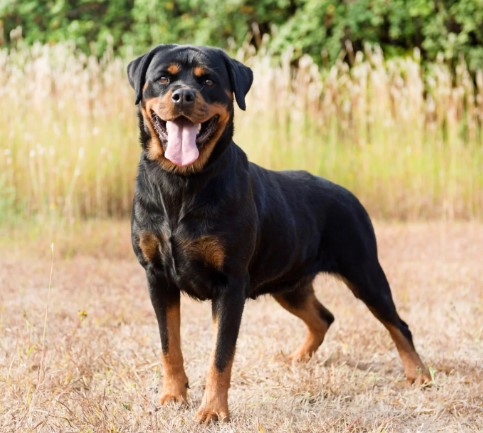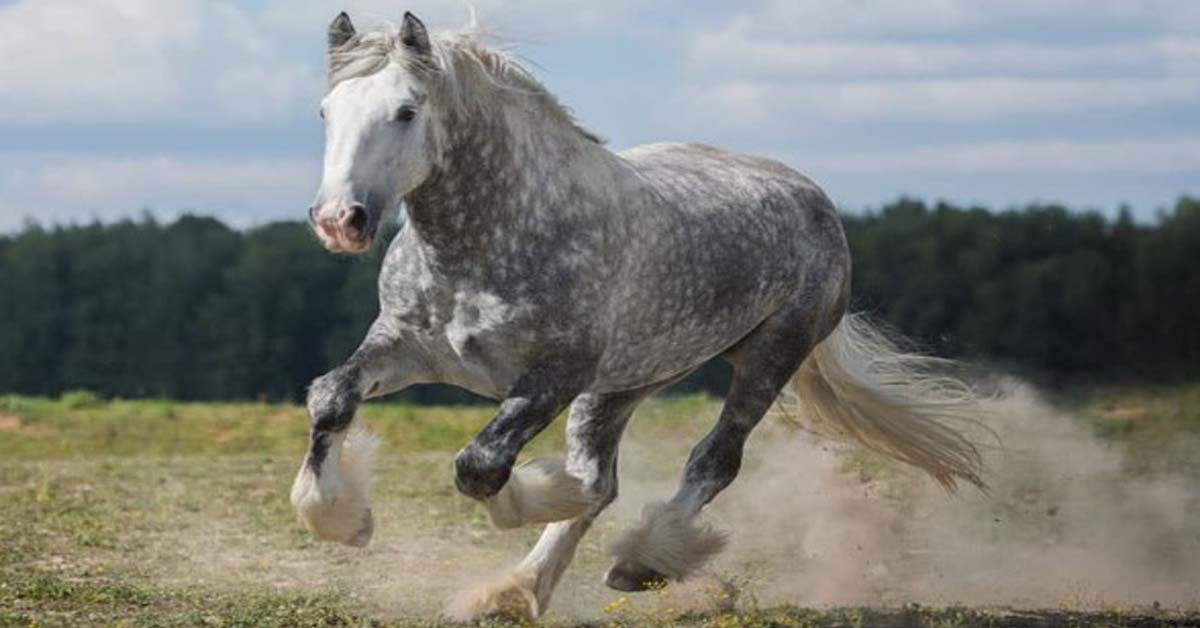German Shepherds Dog (GS) are sizable canines recognized for their noble, energetic, loyal, and highly intelligent nature. Their distinctive brown and black coat, coupled with a streamlined and athletic physique, renders them robust and agile. Beyond their proficiency in herding tasks, German Shepherds are well-suited to serve as companion animals for the visually impaired.
These canines excel in various working roles, particularly in police and military operations, showcasing effectiveness as guard dogs. Naturally, in the right environment, the German Shepherd dog also proves to be an exceptional companion.
German Shepherd- History
As implied by its name, the German Shepherd Dog originated in Germany during the nineteenth century, with Captain Max von Stephanitz playing a pivotal role in its creation. His aim was to develop a versatile canine suitable for service and police work, resulting in a dog that possessed remarkable aesthetics, intelligence, and adaptability.
These versatile and captivating dogs quickly gained popularity beyond Germany, capturing the attention of dog enthusiasts in other countries. While Rin Tin Tin is the most renowned of the early German Shepherds, he was not the first to arrive in the United States. The breed had made its way to the U.S. as early as 1906, and the American Kennel Club officially registered a German Shepherd in 1912. In response to growing interest, enthusiasts formed the German Shepherd Dog Club of America.
The strain faced a decline in popularity during World War I due to its association with the adversary. However, German Shepherds proved their valor by braving ordnance fire, land mines, and tanks to provide German soldiers in the trenches with essential supplies.
Post-war, the strain regained favor, with the likes of Rin Tin Tin and fellow German Shepherd Strongheart featured in films. American audiences developed a strong affinity for them, making the German Shepherd the most popular breed in the United States for a period.
An illustrious modern example of the German Shepherd is Ch. Covy Tucker Hill’s Manhattan, ROM, affectionately known as Hatter. In 1987, Hatter achieved the prestigious Best in Show title at the Westminster Kennel Club, becoming the only German Shepherd to do so. Hatter, known for drawing crowds and especially enjoying interactions with children, remains one of the most well-known representatives of the breed.
Know About German Shepherd Health
The German Shepherd Dog is known to have a predisposition to hip dysplasia, but breeders are actively taking steps to reduce the occurrence of this hereditary condition. In hip dysplasia, the head of the thigh bone does not properly fit into the hip socket.

Read Our Recent Post:
Over time, the bone gradually wears down, leading to painful arthritis. The severity of hip dysplasia can vary, and it may be managed with medication or, in more rigid cases, through surgical hip replacement, which can be a costly procedure. It is impossible to diagnose hip dysplasia in a dog solely through visual observation or monitoring its movement.
Degenerative myelopathy (DM) is one of the most devastating conditions that can afflict German Shepherd Dog (GSDs). This neurological disorder, akin to multiple sclerosis in humans, results in a gradual paralysis of the dog’s hindquarters. Unfortunately, DM is incurable, and eventually, the dog may lose the ability to move independently. Observing the dog for gradual signs of pain and discomfort, rather than sudden onset, is crucial. Regularly checking the dog’s nails for uneven wear and tear is also recommended.
While DM in dogs is incurable, the progression of the condition can be slowed with treatment. Responsible breeders often test their breeding stock for this condition. Ask to see the results of the DNA-based DM Flash test, conducted by the University of Florida or the University of Missouri, as submitted to the Orthopedic Foundation for Animals (OFA).
Similar to many large breeds, German Shepherds are susceptible to various heart conditions, including murmurs, valve issues, and enlarged hearts. Regular heart testing is essential to detect these conditions early, as many of them respond well to treatment.
Health Issues
Ethical breeders aim to uphold the highest breed standards set by kennel clubs such as the AKC. German Shepherd dogs bred according to these standards are less prone to inheriting health issues; however, certain hereditary health concerns may still affect the breed. The following are some conditions to be mindful of:
- Hip dysplasia
- Elbow dysplasia
- Elbow hygroma
- Gastric dilatation-volvulus
- Degenerative myelopathy
Adopt or Buy a German Shepherd Dog
These organizations can offer valuable guidance and a pathway for surrendering a dog, as well as steer you towards reputable breeders if that’s the route you decide to take. The AKC also features a service that allows you to inquire about AKC-registered litters that have been monitored and raised in accordance with breed standards. While prices can vary, the average cost for a German Shepherd puppy is typically around $1,000, depending on factors such as gender, appearance, demand, and more.
Temperaments
Frequently employed as working dogs, German Shepherds embody qualities of bravery, intelligence, alertness, and courage. They are cheerful, responsive, and eager learners, displaying a calm confidence and cleverness. German Shepherds are remarkably loyal and steadfast, willing to sacrifice themselves for their human pack without hesitation. With a high level of adaptability, they love close proximity to their families but may exhibit wariness towards strangers. This breed thrives on companionship and should not be left isolated for extended periods.
German Shepherds are selective in their barking, vocalizing only when they perceive it as necessary. Often utilized in police work, they possess a strong protective instinct and demonstrate great devotion to their trainers. Proper socialization, especially from puppyhood, is crucial. Instances of aggression or attacks on people usually result from inadequate training and handling.
Problems arise when a dog is allowed to assume a leadership role over humans or lacks the necessary mental and physical exercise. Owners must assert natural authority over the dog in a calm, firm, and confident manner. A well-adjusted and trained German Shepherd is generally amicable with other pets and excellent with children within the family.
Early obedience training is essential for German Shepherds, ensuring they develop into stable and well-behaved companions. Dogs of this breed may become skittish or anxious if their instincts are not met or if they have indecisive owners. Training and socialization should commence early in their development.
German Shepherd Dog Breed
The German Shepherd is a popular and versatile dog breed known for its intelligence, trainability, and versatility in various roles. Here are some key characteristics of
the German Shepherd breed:
Origins: The breed originated in Germany in the late 19th and early 20th centuries. It was initially developed for herding sheep but quickly gained recognition for its intelligence and versatility.
Appearance: German Shepherds are medium to large-sized dogs with a strong and athletic build. They have a distinctive double coat that is usually dense and straight. Common colorations include black and tan, sable, and all black.
Temperament: German Shepherds are known for their loyalty, courage, and confidence. They are often used as working dogs in various roles, including police, military, search and rescue, and as service dogs. They are also popular as family pets due to their protective nature and affectionate behavior towards their owners.
Intelligence: German Shepherds are highly intelligent dogs and are ranked among the most trainable breeds. They excel in obedience training and are quick learners, making them suitable for a variety of tasks and activities.
Activity Level: These dogs are energetic and require regular exercise and mental stimulation. Daily walks, playtime, and training sessions are important to keep them physically and mentally engaged.
Health: While German Shepherds are generally healthy, they can be prone to certain health issues such as hip dysplasia and elbow dysplasia. Regular veterinary check-ups, a balanced diet, and proper exercise are essential for maintaining their well-being.
Socialization: Early socialization is crucial for German Shepherds to ensure they grow up to be well-behaved and confident. Exposing them to various people, environments, and situations helps prevent behavioral issues.
Shedding: German Shepherds shed moderately throughout the year, and their coat requires regular grooming to control shedding and maintain its health.
Guarding Instinct: German Shepherds have a natural guarding instinct, which makes them excellent watchdogs. They are protective of their families and can be aloof with strangers.
Popularity: The German Shepherd is consistently ranked among the most popular dog breeds globally. Their versatility, intelligence, and loyalty contribute to their widespread appeal.
German Shepherd Overview
| HEIGHT: 22 to 26 inches |
| WEIGHT: 60 to 100 pounds |
| GROUP: Herding |
| COAT: Coarse, medium-length double coat |
| LIFE SPAN: 7 to 10 years |
| COAT COLOR: Most colors are acceptable, such as bicolor, black and tan, black and cream, black and red, black and silver, solid black, gray, and sable. Note that blue, liver, or white are unfavorable based on breed standards. |
| ORIGIN: Germany |
| TEMPERAMENT: Intelligent, courageous, alert, bold, loyal, protective |
Grooming
German Shepherds possess a coarse, sometimes wiry, medium-length coat with thick ear leathers. To counter their moderately high shedding rate, their coat should be brushed every few days, reducing the shedding through regular grooming. Nonetheless, expect canine hair on your clothing and furniture, requiring frequent vacuuming.
Fortunately, the German Shepherd’s coat exhibits resistance to dirt and debris, sparing you from frequent baths—once a month is typically sufficient. Excessive bathing can strip away the natural oils essential for maintaining a healthy coat.
Maintain your dog’s comfort by regularly trimming its nails. Additionally, support good dental hygiene by brushing its teeth a few times a week. Given their inclination to chew and robust jaws, provide durable chew toys for your German Shepherd.
Facts About German Shepherd
- The German Shepherd is highly intelligent and thrives on an active lifestyle, making a couch potato existence unsuitable for him. This canine is one of action and requires a living environment with an active individual who can provide tasks aligned with his inclinations.
- Known for their affection towards children, German Shepherds make excellent family dogs, particularly when they undergo early socialization and training.
- While the conventional image of a German Shepherd is often black and tan, it’s important to note that they can also appear in solid black. Puppies with white, blue, or liver-colored coats are generally discouraged by breeders, so it’s wise to be cautious of marketing claims suggesting these colors are “rare” and command a higher price.
- A well-bred German Shepherd should never exhibit traits of shyness, nervousness, or aggression.
German Shepherd Puppy

Puppy Training Timeline for Your German Shepherd Dog #German Shepherd Puppys
From 8 to 16 Weeks
- Training Goal #1: Socialization
- Training Goal #2: Crate Training
- Training Goal #3: Housetraining
From 3 to 9 Months
- Training Goal #1: Begin Obedience Training
- Training Goal #2: Recall
- Training Goal #3: Impulse Control
Top 10 Best Foods For German Shepherds
| Royal Canin German Shepherd Puppy Dry Dog Food, 30-lb bag |
| Royal Canin German Shepherd Adult Dry Dog Food, 17-lb bag |
| Dr. Gary’s Best Breed Holistic German Dry Dog Food, 30-lb bag |
| Large Large Breed Formula Adult Dry Dog Food, 11-lb bag |
| Diamond Naturals Large Breed Adult Chicken & Rice Formula Dry |
| Royal Canin German Shepherd Loaf in Sauce Canned Dog Food, |
| Merrick Grain Free Large Breed Dry Dog Food Real Chicken |
| Nutro Ultra Large Breed Adult Dry Dog Food, 30-lb bag |
| Purina ONE SmartBlend Large Breed Adult Formula Dry Dog |
Origin Of German Shepherd
In Karlsruhe, Germany, Captain Max von Stephanitz and a group of dedicated breeders crafted an intelligent, obedient, and aesthetically pleasing German Shepherd. They achieved this by selectively breeding from eggheaded, shorthaired, and line-haired herding and ranch dogs originating in Wurtemberg, Thuringia, and Bavaria. The dogs were showcased at Hanover in 1882, with the shorthaired variety making its debut in Berlin in 1889.
In April 1899, von Stephanitz officially registered a dog named Horan as the first Deutsche Schäferhunde, translating to “German Shepherd Dog” in English. Until 1915, both eggheaded and line-haired varieties were presented at shows. However, in most countries, only the short-haired variety is now recognized for show purposes. The German Shepherd made its debut in the United States in 1907, receiving recognition from the AKC in 1908. The breed gained significant popularity thanks to German Shepherds featured in films like Rin-Tin-Tin and Strongheart.
Breed Characteristics
| Recognition | Ratings (In Points) |
| Adaptability | 5 Points |
| Dog Friendly | 2 Points |
| Shedding Level | 5 Points |
| Affection Level | 3 Points |
| Exercise Needs | 3 Points |
| Social Needs | 3 Points |
| Apartment Friendly | 3 Points |
| Grooming | 3 Points |
| Stranger Friendly | 1 Point |
| Barking Tendencies | 2 Points |
| Health Issues | 4 Points |
| Territorial | 5 Points |
| Cat Friendly | 3 Points |
| Intelligence | 5 Points |
| Trainability | 5 Points |
| Child Friendly | 5 Points |
| Playfulness | 3 Points |
| Watchdog Ability | 5 Points |
Needs For Living
Due to their size, strength, and strong guarding instincts, it is crucial to exercise great caution when acquiring German Shepherd puppies, opting for reputable breeders. Poorly bred dogs are more prone to nervousness.
To address guarding tendencies and potential aggression, German Shepherd puppies should undergo precise socialization from an early age and receive obedience training. It is essential for them to be part of the family, regularly exposed to people and other pets under supervision in the neighborhood. Confining them to a kennel or area alone or with other dogs is discouraged.
German Shepherd puppies are energetic and require engaging activities. They need substantial daily exercise; otherwise, they may become mischievous or high-strung.
The breed experiences heavy shedding approximately twice a year, with a lower level of shedding continuously. To manage shedding and maintain the coat’s condition, regular brushing several times a week is recommended.
German Shepherd Review
Most Asked Answers And Questions
Is a German Shepherd a suitable house pet?
German Shepherds can be affectionate companions and effective family protectors when given proper training and socialization. This breed is well-suited for active households, and their intelligence and protective instincts make them a good choice for families with children, provided the dog undergoes adequate training.
Are German Shepherds easy to handle as pets?
German Shepherd puppies generally get along well with children and other pets if raised with them. However, due to their inherent guarding instincts, they may be cautious around strangers. Known for their intelligence, German Shepherds are considered easy to train. It’s important to note that poorly bred individuals of this breed may exhibit high-strung and nervous behavior.
Why are German Shepherds not recommended as pets?
German Shepherds may not be ideal as pets for various reasons. They shed a considerable amount, are high-energy dogs, and can display aggression if not properly socialized. They are prone to separation anxiety, may struggle in apartment living, can exhibit dominant behavior, and tend to be relatively expensive to care for. Additionally, they may develop health conditions such as hip dysplasia and arthritis.
What are the 5 types of German Shepherds?
The 5 Types of German Shepherds are:
West-German Working Line German Shepherds.
East German DDR Working Line German Shepherds.
Czech Working Lines German Shepherds.
American Show Line German Shepherds.
European Show Line German Shepherds.
Does the German Shepherd bark a lot?
Yes, German Shepherds tend to bark more than some other large dog breeds. Despite training and socialization efforts, they commonly exhibit a higher level of vocalization.
People Most Searched on Google
| German shepherds |
| german shepherd puppies |
| german shepherd puppy |
| black german shepherds |
| black german shepherd |
| german shepherd black |
| shepherds |
| german shepherd golden retriever mix |












5 thoughts on “German Shepherd Dog Breed: 1 of Best Information For You…”